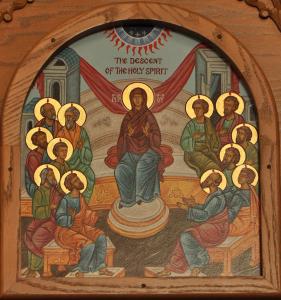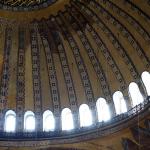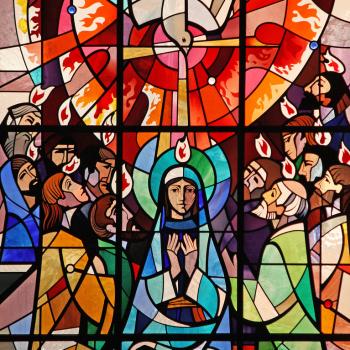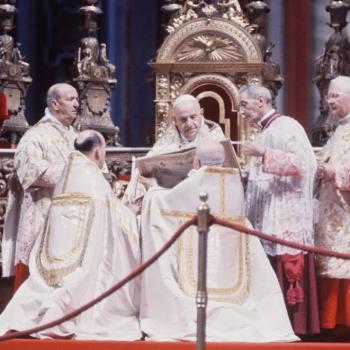
Before his ascension, Jesus said he would not leave the faithful behind. His presence would be with them until the end of the world. Likewise, he said that they would be provided another Comforter, the Holy Spirit (cf. Jn. 14:16). The two promises go together. Through the Spirit, the presence of Christ is made spiritually present. Likewise, the Spirit, the Spirit of Christ, is the living water which Christ said he would give to all who would believe and, in their thirst, ask for it:
On the last day of the feast, the great day, Jesus stood up and proclaimed, “If any one thirst, let him come to me and drink. He who believes in me, as the scripture has said, `Out of his heart shall flow rivers of living water.'” Now this he said about the Spirit, which those who believed in him were to receive; for as yet the Spirit had not been given, because Jesus was not yet glorified (Jn. 7:37-39 RSV).
The Spirit, the Spirit of Christ, is God. Even before the incarnation, the Spirit was active, helping people to be holy and follow after righteousness. Some were so inspired by the Spirit that they became prophets who were able to speak on behalf of God. But, for all of them, the presence of the Spirit, even for the prophets, was not constant. The Spirit could be grieved and turn away from them. Likewise, the Spirit’s presence was not universal, that is, not everyone had direct experiences of it in their lives, which sometimes had those who did not experience the Spirit become jealous of those who did. Nonetheless, those who experienced the Spirit often did not want the burden they experienced, and indeed, hoped and desired that what they had could be made universal. Thus, when Joshua indicated the way some were jealous of Moses and his connection with the Spirit, Moses said that he wished everyone could be made into a prophet: “But Moses said to him, ‘Are you jealous for my sake? Would that all the LORD’s people were prophets, that the LORD would put his spirit upon them!’” (Num. 11:29 RSV). Moses’ desire was good and true and it was one which the Spirit, through Joel, indicated would happen one day: “And it shall come to pass afterward, that I will pour out my spirit on all flesh; your sons and your daughters shall prophesy, your old men shall dream dreams, and your young men shall see visions” (Joel 2:28 RSV).
On Pentecost, the Spirit was sent out, not just to believers, but over the whole of creation, so that the Spirit now engaged the world and those in it in a new way. It came upon Christians, giving them the comfort they needed, and with it, the presence of Christ:
When the day of Pentecost had come, they were all together in one place. And suddenly a sound came from heaven like the rush of a mighty wind, and it filled all the house where they were sitting. And there appeared to them tongues as of fire, distributed and resting on each one of them. And they were all filled with the Holy Spirit and began to speak in other tongues, as the Spirit gave them utterance (Acts 2:1-4 RSV).
With his ascension, Jesus fulfilled his earthly ministry, taking what is of the earth and uniting it with heaven. The kingdom of God, the eschatological glory, could finally be shared and experienced, at least in part, by all those on earth. The physical presence of Christ was taken away by the ascension, but it was replaced by the gift of the Spirit and the spiritual presence of Christ contained with the Spirit. For, we must understand, the Spirit is the Spirit of Christ, and where the Spirit is found, the presence of Christ is likewise found. Pentecost, therefore, is about making the Spirit, the living water, available to all, and with it, therefore, the presence of Christ is also shared so that Christ truly can be with us unto the end of the world. It is a presence which is spiritual, and different from the sacramental presence found in the eucharist (for the Spirit gives us a mediated experience of the presence of Christ, while the eucharist grants us an unmediated communion with Christ).
Pentecost, therefore, is important, because through it, not only did Jesus send the Spirit, but he provided the means by which he can be and will be present to us and the rest of the world until he comes again at the Parousia (that is, when he comes again, not only in a spiritual or sacramental presence, but with his physical presence as well). And just as the Spirit directed the prophets so that they could speak on behalf of God, promoting justice as well as the hope for the messianic age, so now all Christians who are touched by the Spirit should be prophets, speaking on behalf of God by promoting restorative justice and peace so as to prepare the world for the Parousia.
The living water, the Spirit, has been given to Christians, not as some treasure which they should guard with jealousy, but as a gift which is to be shared with others. All people, indeed, all things, should be made holy and just in its presence. Christians are meant to be prophets in the world. They should follow the prompting of the Spirit; they should prophesy and dream dreams of eschatological glory. They should know that they must do more than speak, but follow through with what they speak about, so that justice and grace are not seen as something separate from the world, but something which is found in it as well.
To have a messianic or eschatological dream is to have a dream for God’s justice. To be a prophet is to be one who promotes that justice in the world – to be like Christ, speaking on behalf of the poor and needy, the outcast and abused, indeed, those who have had their dignity taken away from them by the powers that be. The living water should flow through Christians, giving them the presence of Christ in their lives, but as it is a living water, a stream, so to speak, of the Spirit, Christians should go with the flow, following where the Spirit should take them, doing what the Spirit expects of them in each and every situation they find themselves in. The Christian life should be dynamic, filled with the Spirit, filled with the presence of Christ. Christians should imitate prophets like Moses, who did not seek the Spirit out of selfish desires, but rather, because they have a heart for God and desire the justice of God to be established on earth as it is in heaven. They must stand up and speak boldly on behalf of those harmed by sin and the structures of sin. If they do not, they risk quenching the Spirit and with it, cutting themselves off from the presence of Christ, indeed, the presence of God in their lives.
Stay in touch! Like A Little Bit of Nothing on Facebook.
If you liked what you read, please consider sharing it with your friends and family!

















